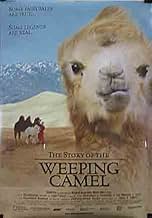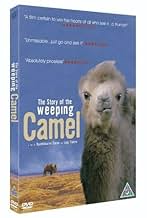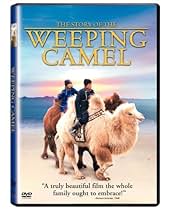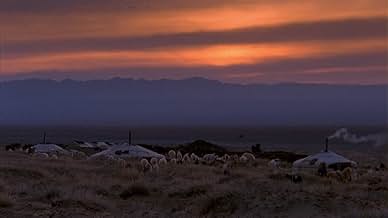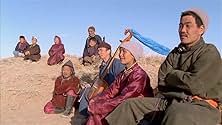IMDb-BEWERTUNG
7,4/10
6511
IHRE BEWERTUNG
Als das frisch geborene Kamelfohlen einer mongolischen Nomadenfamilie vom Muttertier zurückgewiesen wird, muss ein Musiker herbeigeholt werden, der es durch ein Ritual umstimmen soll.Als das frisch geborene Kamelfohlen einer mongolischen Nomadenfamilie vom Muttertier zurückgewiesen wird, muss ein Musiker herbeigeholt werden, der es durch ein Ritual umstimmen soll.Als das frisch geborene Kamelfohlen einer mongolischen Nomadenfamilie vom Muttertier zurückgewiesen wird, muss ein Musiker herbeigeholt werden, der es durch ein Ritual umstimmen soll.
- Regie
- Drehbuch
- Hauptbesetzung
- Für 1 Oscar nominiert
- 10 Gewinne & 9 Nominierungen insgesamt
Empfohlene Bewertungen
In the Gobi desert, where a nomadic tribe tends its camels like Jay Leno his automobiles, a mother rejects a white calf just delivered with difficulty. The society's initiative to bring mother to nurse the child is the center of an otherwise simple plot. The astounding cinematography (Yes, the desert is stunning even after 90 minutes) and the scrubbed-face happiness of the family are the real stars of this half documentary, half reenactment of a crisis every bit as important to this family as a birth is to a tightly-knit family anywhere in the rest of the world.
And yet a theme appears as I reflect on the happiness of this attractive clan: the emergence of modernism even in Mongolia. In two young men's 50-kilometer journey to find help for the camel, they discover television and computer games. The younger boy, fascinated by the technology, asks his father to purchase a TV. The grandfather gently offers his concern that the boy would be watching fleeting glass images-the case is closed, a powerful reminder of the benign presence of grandparents in this culture, the wisdom of elders, and the fresh-aired innocence of the clan, which will not give itself up easily to modern distractions. Besides, it is abundantly clear they don't need passive entertainment.
The ceremony to reconcile the mother and calf includes primitive music by a teacher and impressive solo singing by a young woman. No one could possibly turn to TV while watching this transcendent act. `Whale Rider's' heightened sense of the magical in the mundane and the unbelievable bond of young and old is the only other recent film I can think of to approach this film's simple power.
`The Story of the Weeping Camel' is as slow as the culture it shows, so be cautious about bringing restless city children. The story lingers on the actual birth of the white calf, possibly disconcerting to the younger, inexperienced members of the audience. Then why do the film's characters get such joy out of the minor warnings I just gave? It is their life, as blessed and happy as any you will see on film or anywhere else on earth.
The camel's soulful cry in the vast desert will stay with you. As Lafcadio Hearn said, `If you ever become a father, I think the strangest and strongest sensation of your life will be hearing for the first time the thin cry of your own child.' And that goes for the mother's cry as well.
A beautiful film out of time and step with a lesser world outside.
And yet a theme appears as I reflect on the happiness of this attractive clan: the emergence of modernism even in Mongolia. In two young men's 50-kilometer journey to find help for the camel, they discover television and computer games. The younger boy, fascinated by the technology, asks his father to purchase a TV. The grandfather gently offers his concern that the boy would be watching fleeting glass images-the case is closed, a powerful reminder of the benign presence of grandparents in this culture, the wisdom of elders, and the fresh-aired innocence of the clan, which will not give itself up easily to modern distractions. Besides, it is abundantly clear they don't need passive entertainment.
The ceremony to reconcile the mother and calf includes primitive music by a teacher and impressive solo singing by a young woman. No one could possibly turn to TV while watching this transcendent act. `Whale Rider's' heightened sense of the magical in the mundane and the unbelievable bond of young and old is the only other recent film I can think of to approach this film's simple power.
`The Story of the Weeping Camel' is as slow as the culture it shows, so be cautious about bringing restless city children. The story lingers on the actual birth of the white calf, possibly disconcerting to the younger, inexperienced members of the audience. Then why do the film's characters get such joy out of the minor warnings I just gave? It is their life, as blessed and happy as any you will see on film or anywhere else on earth.
The camel's soulful cry in the vast desert will stay with you. As Lafcadio Hearn said, `If you ever become a father, I think the strangest and strongest sensation of your life will be hearing for the first time the thin cry of your own child.' And that goes for the mother's cry as well.
A beautiful film out of time and step with a lesser world outside.
In the spring of the Gobi Desert, in South Mongolia, a nomadic family of shepherds has troubles when one camel has a tough two days delivery, immediately rejecting the offspring. The family unsuccessfully uses their best efforts trying to force the female to accept and feed the newborn. When there is no further hope of saving the animal, they send their two sons to bring a musician from the nearest town to perform a ritual and save the "baby camel".
I do not know, and I was really curious to know, how could be the original screenplay of this documentary. I believe the first intention of directors Byambasuren Davaa and Luigi Falorni would be to document the lifestyle of a nomadic family of shepherds, showing a different culture for the Westerners. However, fortune gave them the opportunity of sharing a great experience with the viewers with the ritual that brought the camel to accept the offspring. Thank you, Messrs. Byambasuren Davaa and Luigi Falorni, for such touching, beautiful and wonderful film. My vote is nine.
Title (Brazil): "Camelos Também Choram" ("Camels Also Weep")
I do not know, and I was really curious to know, how could be the original screenplay of this documentary. I believe the first intention of directors Byambasuren Davaa and Luigi Falorni would be to document the lifestyle of a nomadic family of shepherds, showing a different culture for the Westerners. However, fortune gave them the opportunity of sharing a great experience with the viewers with the ritual that brought the camel to accept the offspring. Thank you, Messrs. Byambasuren Davaa and Luigi Falorni, for such touching, beautiful and wonderful film. My vote is nine.
Title (Brazil): "Camelos Também Choram" ("Camels Also Weep")
This is a great opportunity for getting a first eye view about a civilization and a culture so completely different from ours, that it's worth the price of admission.
Living in the remote Gobi desert, we encounter a small family that live from the sheep they raise and their camels, that are used as a form of transportation. The living conditions are primitive, to put it mildly, yet the family in the film seem content with what they have to live with. Most of the activities are centered around the home.
As the film unfolds, we are witnesses to the amazing birth of the last colt of the season. It is an ordeal for the first time mother having this offspring, a labor that goes on forever, until the men of the village take matters into their hands and help with the birth. The white colt that is born in front of our eyes, has to be guided to the mother for his nourishment, only to be rejected by her. We watch as one of the women manages to milk the mother camel in order to feed the colt. When all fails, as the mother camel keeps rejecting the colt, they resort to a sort of a ritual that involves a violin player coming to the family's help to play music for the animal, and ultimately mother and son are miraculously reunited.
The views of the desert are beautiful in their remoteness and desolation. Somehow we are drawn into this family's life in a way that we never thought we could get to know anyone. The final irony is that after the young children go into the nearest town they finally see their first television broadcast and are fascinated by it.
The film is refreshing as it shows how the different members of this small family care for one another. They are fortunate indeed, because being away from all the consumerism and material things, they manage to stay focused in living under those conditions in that unfriendly environment.
Living in the remote Gobi desert, we encounter a small family that live from the sheep they raise and their camels, that are used as a form of transportation. The living conditions are primitive, to put it mildly, yet the family in the film seem content with what they have to live with. Most of the activities are centered around the home.
As the film unfolds, we are witnesses to the amazing birth of the last colt of the season. It is an ordeal for the first time mother having this offspring, a labor that goes on forever, until the men of the village take matters into their hands and help with the birth. The white colt that is born in front of our eyes, has to be guided to the mother for his nourishment, only to be rejected by her. We watch as one of the women manages to milk the mother camel in order to feed the colt. When all fails, as the mother camel keeps rejecting the colt, they resort to a sort of a ritual that involves a violin player coming to the family's help to play music for the animal, and ultimately mother and son are miraculously reunited.
The views of the desert are beautiful in their remoteness and desolation. Somehow we are drawn into this family's life in a way that we never thought we could get to know anyone. The final irony is that after the young children go into the nearest town they finally see their first television broadcast and are fascinated by it.
The film is refreshing as it shows how the different members of this small family care for one another. They are fortunate indeed, because being away from all the consumerism and material things, they manage to stay focused in living under those conditions in that unfriendly environment.
In Mongolia in the Gobi desert a four-generation family of herders lives a tough, plain life. One of their camels gives birth but refuses to accept the calf. They care for the calf, try to hand-feed it, and decide to send for a player of music. The belief is that the music may make the camel accept the calf, and if it does the camel will weep.
The movie is classified as a documentary, but it is much more the story of the ways of this particular family, how they live, how they raise their small children, how the experience of the grandparents is used, how they care for their herds. Customs and rituals provide comfort. Electricity, television, ice cream provide temptations, but are more or less accepted as expensive facts of life which they aren't particularly tempted by. The actors all appear to be nonprofessionals.
This is the kind of movie you have to let yourself accept for what it is...a gentle, unobtrusive look at a way of life far different from ours. Well worth seeing.
The movie is classified as a documentary, but it is much more the story of the ways of this particular family, how they live, how they raise their small children, how the experience of the grandparents is used, how they care for their herds. Customs and rituals provide comfort. Electricity, television, ice cream provide temptations, but are more or less accepted as expensive facts of life which they aren't particularly tempted by. The actors all appear to be nonprofessionals.
This is the kind of movie you have to let yourself accept for what it is...a gentle, unobtrusive look at a way of life far different from ours. Well worth seeing.
There's a new style of film eking into the film biz called "Narrative Documentary." What? An oxymoron you tutt-tutt silently as you read.Well, yes and no. It describes a documentary that has been embellished with narrative scenes to ultimately create the arc-drama one finds in a feature film with the intelligence of a documentary.
Narrative documentary is truly an appropriate expression for this wonderfully unique and intriguing little gem, The Story of the Weeping Camel.
As you watch the fairly simple tale of a camel that after a grueling birthing of her albino calf, she decides she's not interested in the ideas of motherhood and abandons the newborn to fend for itself.
Sounds positively dull until you start to watch this young mother and the footage the filmmakers gathered and you are pulled in - mesmerized, "How did the film crew get this?" It feels like a documentary, looks like a documentary but then there's the story obviously running along side the remarkable footage that you realize is scripted, storyboarded and a team behind the lens have planned. Amazing.
Narrative documentary is truly an appropriate expression for this wonderfully unique and intriguing little gem, The Story of the Weeping Camel.
As you watch the fairly simple tale of a camel that after a grueling birthing of her albino calf, she decides she's not interested in the ideas of motherhood and abandons the newborn to fend for itself.
Sounds positively dull until you start to watch this young mother and the footage the filmmakers gathered and you are pulled in - mesmerized, "How did the film crew get this?" It feels like a documentary, looks like a documentary but then there's the story obviously running along side the remarkable footage that you realize is scripted, storyboarded and a team behind the lens have planned. Amazing.
Wusstest du schon
- WissenswertesOfficial submission of Mongolia for the 'Best Foreign Language Film' category of the 76th Academy Awards in 2004.
- VerbindungenFeatured in The 77th Annual Academy Awards (2005)
Top-Auswahl
Melde dich zum Bewerten an und greife auf die Watchlist für personalisierte Empfehlungen zu.
- How long is The Story of the Weeping Camel?Powered by Alexa
Details
- Erscheinungsdatum
- Herkunftsländer
- Offizielle Standorte
- Sprache
- Auch bekannt als
- The Story of the Weeping Camel
- Drehorte
- Produktionsfirmen
- Weitere beteiligte Unternehmen bei IMDbPro anzeigen
Box Office
- Bruttoertrag in den USA und Kanada
- 1.763.052 $
- Eröffnungswochenende in den USA und in Kanada
- 21.767 $
- 6. Juni 2004
- Weltweiter Bruttoertrag
- 9.328.652 $
- Laufzeit
- 1 Std. 33 Min.(93 min)
- Farbe
- Sound-Mix
- Seitenverhältnis
- 1.85 : 1
Zu dieser Seite beitragen
Bearbeitung vorschlagen oder fehlenden Inhalt hinzufügen



